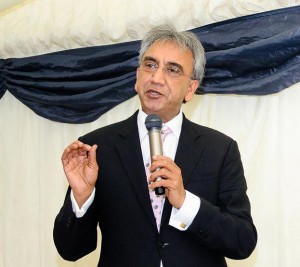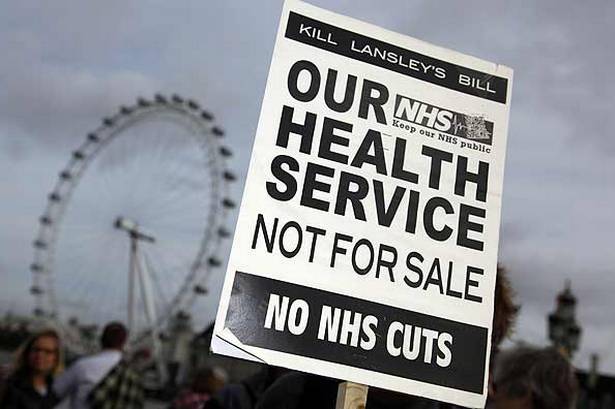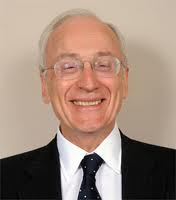In a hard-hitting
investigative exposé, Andrew Robertson examines the network of vested interests
that runs between Parliament and the private healthcare industry. This cosy,
toxic relationship, he warns, threatens not only the future of the NHS but that
of democracy in the UK. This article appeared in Ceasefire magazine.
As the Lords and
Baronesses of the UK’s parliamentary chamber debated the government’s Health
and Social Care bill, it was revealed by the Daily Mirror that 40 of these
Peers had financial interests in companies involved in private healthcare. This
number, though shocking, was just the tip of the iceberg. Further research
revealed the true extent of the financial interests the unelected Peers of the
House of Lords had in passing the Health and Social Care bill.
Carrying the
Mirror’s research further, we at Social Investigations, went
through the Lords’ register of interests with a fine tooth comb. In total, an
extraordinary142 Peers were found to have financial interests in companies
involved in private healthcare. These interests are, however, not the exclusive
domain of a single party, but highlight self-interest that is endemic within every
major party of every political persuasion, raising the question: Who are they
actually serving?
In total 1 in 4
Conservative Peers were found to have these vested interests. The Labour Party
had a total of 1 in 6, a number equalled by the Crossbench Peers, and the
Liberal Democrat Peers, the coalition’s willing partners in passing the bill,
had a total of 1 in 10 with such interests.
So what of these
connections?
The mixture of
the Peers’ financial interest and involvement varies. Some MPs have shares in
healthcare companies set to benefit from the bill’s passing. Some are chairmen,
partners, consultants, or are acting as senior advisers to investment groups
funding the private companies, such as private equity firms, ready to swoop.
These interests,
although indicative of where their priorities lie, would be less influential if
the Peers were prevented from voting when they have a conflict of interest. At
local government level, such conflicts come under a ruling of ‘prejudicial
interest’, which requires the councillor to leave the room and take no further
part in discussions or voting. No such safeguard exists in the House of Lords.
The subject of
voting with conflicts of interest was put to the Peers after Social
Investigations emailed all 142 with financial interests.
The email stated:
‘It is obvious
that with these vested interests there is a conflict of interest and many who
have seen this list are quite frankly shocked that this situation exists
whereby those with vested interests can and are voting in favour of policies
which could benefit those interests through the promotion of the further
privatisation of the NHS.’
The response was
notable in its silence, except for a single reply from Liberal Democrat Peer
Baroness Barker, who ignored the issue of interests and simply stated:
‘Please supply
your evidence that any of the people named below…have failed to declare their
interests as they are required to do. Please supply your evidence that the
individuals named below have furthered their own interests. Please supply as
much detail as you have.’
Apparently a list
of 142 Peers who have financial connections to private healthcare companies and
are taking part in a bill that will hand more opportunities to private
healthcare is not ‘evidence’ enough; but of course, by evidence, she means
evidence that the Peers are not abiding by the existing rules, which simply
require them to declare their interests, but do not prevent them from voting on
issues that may directly benefit those interests. There is as of now no mention
of preventing these conflicts of interest in the House of Lords reforms
currently being put forward by the Liberal Democrat leader Nick Clegg.
 |
| Lord Popat |
Take Lord Popat,
a nursing and care home tycoon who has given the Conservatives a total of £319,641.
The Ugandan-born dad-of-three has amassed an estimated £42million fortune as
founder and chief of TLC Group, which provides services for the elderly. Prime
Minister Cameron made the businessman a Peer shortly after entering No10 in May
2010. Lord Popat’s donations include a £25,000 gift registered a week after the
Conservatives health reforms were unveiled in July last year.
This blatant
money for power behaviour is matched by the actions of another Conservative
Peer Lord Chadlington, who has been in the House of Lords since 1996. Lord
Chadlington is the founder and chairman of a PR and communications company
called Huntsworth plc. One arm of the group is Huntsworth Health, which
operates globally, and here in the UK. Its website states that the company ‘provides
a full continuum of consulting and communications services to the healthcare
and well-being industry.’
In the same month
as the white paper was released, Huntsworth Health acquired healthcare
communications agency, ScopeMedical for £4.6m, thus expanding its health
division. Lord Chadlington said of the takeover: “We are delighted to announce
the acquisition…Healthcare is a major growth area and we are now very well
positioned to take advantage of that growth.’
Not only do they
have Lord Chadlington as their CEO, but up until last year, they also had
Labour Peer Lord Puttnam as a Director, and from 2001-03 Conservative Peer
Baroness Cumberlege was one of their non-executive directors. If that’s not
enough, they have some finance provided via Liberal Democrat Lord Alliance, who
has shares in the company, making four Lords, from three main parties, working
for one company.
Huntsworth plc
gave £15,500 to the Conservative party in August last year and has given money
every year since 2008. Lord Chadlington and his wife have personally given more
than £20,000 to the local party since 2007, including a sum of £10,000 for his
leadership campaign. All within the rules that make it almost impossible to
prove their actions will exclusively benefit his company. This ‘exclusivity’
part of the rules, is an important word, as found out when a complaint was put
to the House of Lords Commissioner for Standards about Lord Chadlington, his
company and its connections to the government and their Health and Social Care
bill.
The response
stated: ‘You have not supplied any evidence to suggest that any of Lord
Chadlington’s votes in connection with this Bill, were designed to confer
exclusive benefit on, as you suggest, Huntsworth plc.’
Why do so many
companies ask Lords to sit on their boards, become chairman and advisors if it
isn’t to access the highest levels of government and acquire an exclusive
benefit?
However, private
companies don’t just rely on a vote to get want they want; they want to be
where the centre for information is too. The Associate Parliamentary Health
Group (APHG), which was launched in November 2001 was set up with the intention
to provide: ‘information with balance and impartiality on local as well as
national matters, and is recognised as one of the preferred sources of
information on health in Parliament.’
Four key members
of the APHG have financial links to companies involved in private healthcare.
The Chair of the APGH is Baroness Cumberlege, who runs a company called
Cumberlege Connections. Her company is involved in running training programmes
for medical staff, but also covers the topic of ‘Politics, Power
and Persuasion’, in a tailored two-day
programme which includes topics such as: ‘Managing the markets,
the challenges of commissioning’, ‘who’s who’, and ‘brokering deals with other
independent sector providers’; the latter programme is delivered by the
Baroness herself.
In 2009,
following a complaint from transparency campaigners Spinwatch, the Baroness was
forced to admit that she had run her business from the House of Lords until it “took
off”, and failed to declare her company’s interests in any debates. The
disciplinary action involved nothing more than having to make an apology.
One of the key
areas of the Health and Social Care bill involves handing over the purchasing
power for services from Primary Care Trusts (PCTs), who were previously in
charge of this, to local Commissioning Groups led by Doctors. In order to get
these new Groups into a position where they can carry out the complicated
duties of commissioning, a collection of ‘Approved Providers’ were formed to be
part of a national framework from which the GP groups had to choose from. It is
here that private business has already been making money from the reforms. The
partnerships are largely made up of private companies, who bid for contracts to
develop the new GP groups. Baroness Cumberlege placed her company into one of
these Alliances led by management consultancy company PricewaterhouseCoopers,
who were bidding for and winning contracts as she debated and voted on the
bill, helping it pass into Act.
Another member of
the APHG Lord Hunt of Kings Heath, acts as the groups’ treasurer and has
received payment from Baroness Cumberlege for work as a trainer and consultant.
His input makes up one of five Peers and four MPs who have worked
for her company. Lord Harris of Haringey who is listed as an APHG advisor, has
also been remunerated by Cumberlege Connections for ‘occasional participation
in training events.’ In addition, he is a senior adviser to business services
giant KPMG, who are one of the ‘approved providers’, winning contracts for the
new commissioning
groups.
Mark Britnell,
head of global finance giant KPMG’s health division and an advisor to Prime
Minister David Cameron had announced in a healthcare industry conference in
2010 that the NHS would be shown ‘No mercy.’ Adding: “…and the best time to
take advantage of this will be in the next couple of years.” A rather harsh
choice of words for someone who was employed by the NHS for over a decade.
Finally,
Conservative MP Mark Simmonds, who acts as Co-chair to Baroness Cumberlege on
the parliamentary group, is paid £50,000 a year for 10 hours a month as a
strategic advisor to Circle Health, the first firm to win control of an NHS
hospital. The former shadow minister for health recently had to apologise to
the House of Commons, for ‘inadvertently’
failing to declare his interest when talking in favour of the NHS reforms.
Circle has connections to Health Secretary and the architect of the Health and
Social care bill, Andrew Lansley. Christina Lineen spent two years as an aide
to Mr Lansley prior to moving to Circle as head of communications.
In addition to
the leading roles played by these parliamentarian’s, the APGH has a list of
external associate members, all private health companies, who attend occasional
meetings with the Group. The list, which currently sits at twenty-three
members, must pay a subscription fee to be involved. The amount of members
allowed is capped at 26 and they become a member on a first come, first serve
basis, which according to the manger of the parliamentary group Ella Jackson,
is the fairest and ‘most transparent’ way to operate the membership system.
That however, is where the transparency ends.
The rules of
All-Party Groups demands a record be held of all meetings, and that each Group
must keep sufficient records to enable it to prove that the group meets at
least twice a year. The APGH according to their manager goes further than this,
by ‘audio-recording’ every meeting it holds. The problem is, we the public aren’t
allowed to hear these recordings, because the meetings are held under something
called ‘Chatham House Rules’.
The Chatham House
rule, which doesn’t have to be held in Chatham House to apply, was created back
in 1927 and has since been refined in 1992 and 2002, and exists according to
the Chatham House website;
‘to allow people to speak as individuals, and to express views that may not be
those of their organisations.’ It adds: ‘People usually feel more relaxed if
they don’t have to worry about their reputation or the implications if they are
publicly quoted.’ This lack of transparency applies to the list of attendees
too, where it is forbidden to mention who attended.
In amongst the
list of companies paying their subscription are: Alliance boots, Astrazeneca,
and GlaxoSmithKline; who all have Lords and or MPs with financial links to
their company. Pharmaceutical giant Astrazeneca has 9 Lords who are financially
linked to them, including some who hold shares. GlaxoSmithKline has 17 Lords
with shares in its company and Alliance Boots can boast having Lord Blyth as
one of its former chairman, and former MP Patricia Hewitt, who took a
consultancy job with them 7 months after standing down as an MP.
Ms Jackson of
APGH explained: ‘It’s vital that parliamentarians and other speakers are able
to speak freely in an open and frank exchange, without fear of having their
thoughts reported out of context.’ What could both Peers and MPs with private
healthcare interests and private healthcare companies be talking about that
requires such secrecy? Why invoke a rule created over 80-years ago that
prevents members of the public knowing who was in attendance and what was said?
The Health and
Social care bill is now an Act; the companies who have lobbied for the NHS to
be privatised have taken one giant leap into its eventual dismantling. The
openness, with which money is given to politicians through donations,
highlights an assumption that such behaviour is acceptable. Baroness Barker’s
response doesn’t question that 142 Lords having financial connections to
private healthcare as a problem; but merely points out the technical rules have
been followed.
Our politicians
sit on the boards, they own the companies, they are the directors, and they are
indefinable from one another. The Labour party has promised to repeal the bill,
but as election time comes, will those Labour Lords and MPs with interests in private
healthcare, work behind the scenes to water down any changes? What of the
future? So long as Lords and MPs are allowed to vote on bills that are directly
linked to companies they have a financial interest in, then they will always be
open to representing the corporations for whom they work. They are meant to be
public servants, yet the evidence points towards them serving another element
of society, one that is hidden behind corporate confidentially and ‘Chatham
House’ rules.
Our democracy is
under threat and our parliamentarians are all in this together, and at the very
least should be barred from voting when a prejudicial conflict of interest
appears. Until then, such behaviour will continue and unelected corporations
will continue to hold the reins of power.
Sign the petition
below to try and stop the Lords from being allowed to vote with conflicts of
interest http://epetitions.direct.gov.uk/petitions/31991
Please also check
out this excellent
MediaLens alert on the subject.







